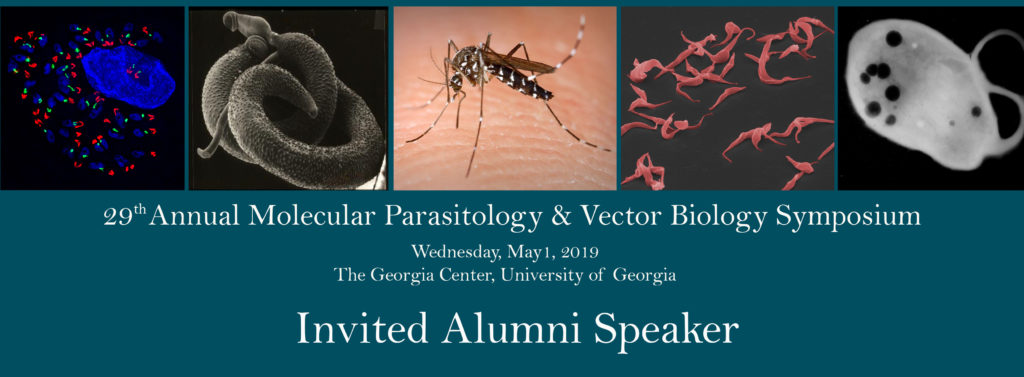Invited Speaker Spotlight: James Morris

About the Speaker
 James Morris is currently a Professor of Genetics and Biochemistry at Clemson University. He earned his BS at The College of William and Mary in Williamsburg VA in 1990 and an M.S. in Entomology at the University of Georgia in Athens GA in 1992. He completed his Ph.D. in Cellular Biology at the University of Georgia in 1997, characterizing the enzymology of a glycosylphosphatidylinositol phospholipase C from the African trypanosome, Trypanosoma brucei, under the supervision of Dr. Kojo Mensa-Wilmot. Following his Ph.D., Jim moved to Baltimore MD to work in the laboratory of Dr. Paul T. Englund, where he was part of the team that developed the first RNAi-based library for forward genetics in any organism – in this case, the African trypanosome. As part of this work, the team developed the vector pZJM (Jim is the “J”) that is still widely used for silencing genes in the parasite.
James Morris is currently a Professor of Genetics and Biochemistry at Clemson University. He earned his BS at The College of William and Mary in Williamsburg VA in 1990 and an M.S. in Entomology at the University of Georgia in Athens GA in 1992. He completed his Ph.D. in Cellular Biology at the University of Georgia in 1997, characterizing the enzymology of a glycosylphosphatidylinositol phospholipase C from the African trypanosome, Trypanosoma brucei, under the supervision of Dr. Kojo Mensa-Wilmot. Following his Ph.D., Jim moved to Baltimore MD to work in the laboratory of Dr. Paul T. Englund, where he was part of the team that developed the first RNAi-based library for forward genetics in any organism – in this case, the African trypanosome. As part of this work, the team developed the vector pZJM (Jim is the “J”) that is still widely used for silencing genes in the parasite.
In 2003, Jim moved to Clemson University as an Assistant Professor in the Department of Genetics and Biochemistry, where he has remained to date. His team has focused on resolving the mechanisms that protozoan parasites use to sense and metabolize the important sugar glucose during infection of their human host. Through these studies, parasite-specific components of the sugar sensing and uptake pathway have been identified and, in an on-going collaborative effort, small molecule inhibitors of the pathways with anti-parasitic activity have been developed. While his team has historically focused on the African trypanosome, more recent work on the malaria parasite Plasmodium falciparum and the brain-eating amoeba Naegleria fowleri suggests that exploiting the sugar metabolism pathways of these single-celled invaders may also prove useful in the development of new therapeutics.
James Morris’s Talk
Dr. Morris will give the following talk at 12:05 pm.
Pour Some Sugar on Me: Glucose, Development, Drug Discovery, and the African Trypanosome
James C. Morris
Eukaryotic Pathogens Innovation Center, Clemson University
Glucose is critical for the infectious blood stages of the African trypanosome, Trypanosoma brucei, serving as both a key metabolic agent and an important signaling molecule. While lack of the hexose is toxic to the proliferative long slender life stage of the parasite, the absence of glucose initiates differentiation in the non-dividing short stumpy (SS) form. These parasites demonstrate hallmarks of development into the next lifecycle stage, the procyclic form (PF) parasite, that include resumption of growth and expression of PF-specific antigens. Both SS differentiation and the growth of the resulting PF parasites is inhibited by glucose and non-metabolizable glucose analogs, with the latter observation suggesting a potential receptor-mediated mechanism for perception of the sugar. The importance of the hexose to the parasite for both metabolic a developmental needs suggests that glucose uptake or distribution inhibitors would be potentially useful anti-parasitic compounds. To identify small molecule inhibitors of glucose acquisition, we developed parasites that endogenously express FRET-based protein glucose sensors in the cytosol or glycosomes. Using these cells, we have completed a 25,000-compound pilot screen and have identified inhibitors with useful medicinal chemistry properties that have potential as a new line of lead compounds against the parasite.
More information about the Molecular Parasitology & Vector Biology Symposium and the schedule of presentions are available on our website. The deadline to register for the symposium is April 24.
